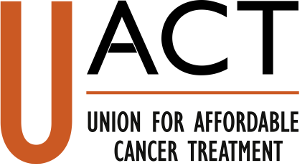These statements were initially drafted in response to a call for public comments regarding administering Hatch-Waxman Act amendments.
The Union for Affordable Cancer Treatment (UACT) is a union of people affected by cancer who are committed to increasing access to effective cancer treatment and care. We are particularly concerned about the rapidly escalating cost of cancer medication and we believe that cancer medicines and other essential medical technologies such as diagnostic tools should be affordable. UACT does not receive funding from drug companies. We make three points:
1. Compulsory licensing. It is obvious that the federal government should negotiate prices for Medicare, and when it does, there should be an adequate statutory basis for issuing compulsory licenses when negotiations break down, so that the patent monopoly is at risk, rather than the cancer patient.
2. Transparency. There is a need for greater transparency of research and development (R&D) expenditures, patent landscape, and manufacturing know-how of medical technologies.
3. Delinkage. Ultimately, high drug prices will be a barrier to access as long as high drug prices are the main way we finance R&D. We need to change the business model for financing and rewarding drug development by delinking R&D incentives from drug prices.
Compulsory Licensing
UACT strongly supports repealing the current restriction on the federal government’s ability to negotiate drug prices for Medicare.
The lack of price negotiations by Medicare has distorted the prices of cancer drugs worldwide. Companies know that Medicare will reimburse extremely high prices. The problems in the Medicare program influence prices in the non-Medicare market in the United States, as well as in other countries.
While UACT strongly supports the notion of price negotiations for Medicare, we are also concerned that such negotiations may result in barriers to access for cancer patients, unless the government has sufficient leverage on prices. Without sufficient leverage, UACT is concerned that the government may then resort to access-limiting restrictions on reimbursements. There needs to be a good statutory framework for HHS to permit the non-voluntary use of drug patents, and sufficient exceptions to any non-patent intellectual property or regulatory exclusivities, for cases when negotiations over reasonable prices reach an impasse. The existing legal framework for compulsory licensing of patents is inadequate and the U.S. lacks sufficient exceptions to regulatory monopolies such as test data exclusivity or orphan drug exclusivity, for cases when prices are excessive.
We recommend that any legislation to authorize Medicare price negotiations include language that would ensure that when there is a dispute over the price, the monopoly is put at risk, rather than the patient.
The following is an example of language that would enhance the negotiating power of the federal government and protect patient access during price negotiations.
Remedy for excessive prices
The Secretary of the Department of Health and Human Services or a designee authorized by the Secretary may limit the remedies for infringement of any patent to payment of a reasonable royalty, and create an exception for any regulatory exclusivity, when such action is necessary in order to enable the competitive supply of any drug, vaccine, medical procedure or diagnostic test that is not available at a reasonable price. The Secretary shall adopt the appropriate rules and procedures to carry out this section.
Transparency
Other measures that will enhance the ability to negotiate reasonable prices include those that would ensure greater transparency, including in particular the costs of each clinical trial used to support the FDA registration or expanded approval of a product, and the value of public sector and charitable funding and subsidies for the development of a product, including the value of the Orphan Drug Tax Credit. It would also be helpful to require companies to disclose the know-how to manufacture approved products, so when legal monopolies expire, there will be more robust and timely competition from suppliers of safe and affordable generic and biosimilar versions.
There are many proposals at the state, federal and international level to require disclosures of
some or all of the above information. Recently, Rep. Lloyd Doggett introduced the Transparent Drug Pricing Act of 2017 (H.R. 4116), which would require that drug manufacturers disclose itemized granular, per-trial R&D expenditures, as well as acquisition costs, costs of marketing and advertising, revenues and profits, subsidies and other federal benefits such as tax credits and grants, and various other information that would create an important means for the public and policy-makers to better address questions about drug prices.
An effective approach would be for the FDA to require such disclosures as a condition of marketing approval.
The Administration should avoid provisions in trade agreements that restrict transparency requirements.
Delinkage
UACT supports proposals to undertake feasibility studies of more radical changes in the business model for drug development that fully delink research and development costs, including incentives, from product prices. With delinkage, price-based formularies for drugs and vaccines can become a thing of the past, and the relationship between a doctor and patient can be focused on the treatments that are medically appropriate, and not be distorted by monopoly prices. More information on this topic here: http://delinkage.org
